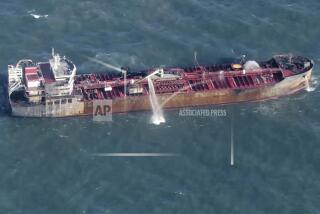Crew errors contributed to oil spill in San Francisco Bay
- Share via
A lack of communication between crew members played a critical role in the crash of a container ship that led to a massive oil spill in San Francisco Bay nearly 15 months ago, federal safety officials said Wednesday.
The 901-foot-long Cosco Busan sideswiped the San Francisco-Oakland Bay Bridge in November 2007. Two fuel tanks ruptured and more than 53,000 gallons of fuel oil spilled.
Investigators told the National Transportation Safety Board on Wednesday that, despite dense fog, the ship’s captain and pilot did not discuss the ship’s proper speed or extra precautions that should have been taken.
The captain’s lack of experience with the bay made him more dependent upon the pilot, the investigators said. Language differences, and perhaps cultural differences, contributed to the captain being less willing to question the authority of somebody with superior knowledge of local waters, investigators said.
The pilot, John Cota, committed several errors, including failure to interpret radar images and to effectively question officials monitoring vessel traffic when queries arose about his course. But safety board chairman Mark Rosenker said a competent captain would have demanded more information from the pilot.
Board member Debbie Hersman said the ship should not have departed in the fog. “This accident started when they left the dock,” she said.
No one was injured, but the spill contaminated 26 miles of shoreline. It also killed more than 2,500 birds and delayed the start of the crab-fishing season. The cleanup cost more than $70 million.
Marine investigator Rob Jones told the board that he believed a competent crew could navigate despite poor visibility. “Ships do depart in fog,” Jones said. “Ships did depart in fog before the Cosco Busan.”
More to Read
Sign up for Essential California
The most important California stories and recommendations in your inbox every morning.
You may occasionally receive promotional content from the Los Angeles Times.













